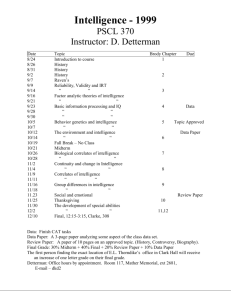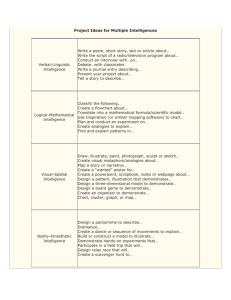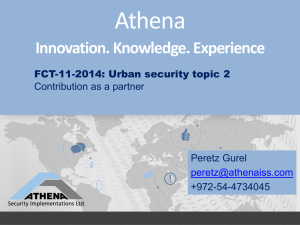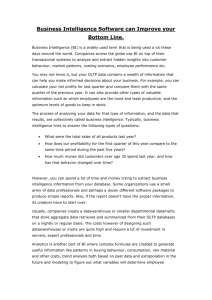Where are we with health intelligence?
advertisement
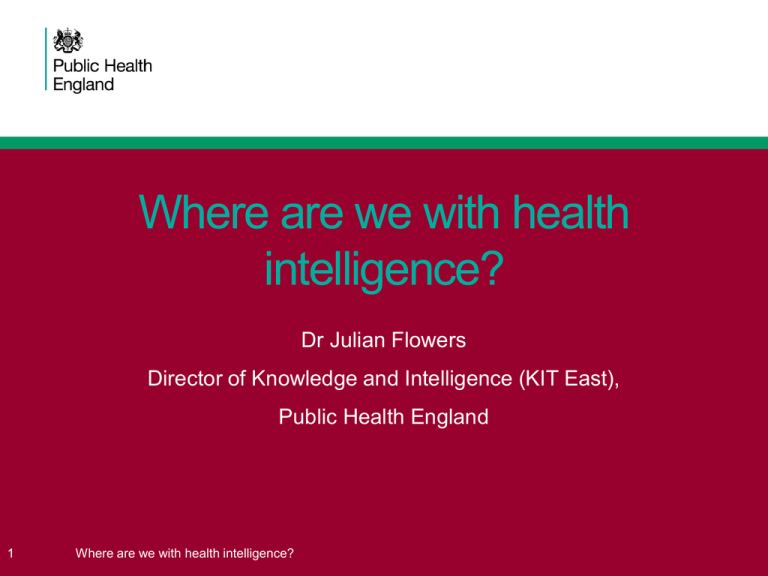
Where are we with health intelligence? Dr Julian Flowers Director of Knowledge and Intelligence (KIT East), Public Health England 1 Where are we with health intelligence? Health intelligence… 2 • Data is the lifeblood of public health • Evidence from data… • Information for action • Improving health with information Flowers, J., & Ferguson, B. (2010). The future of health intelligence: challenges and opportunities. Public Health, 124(5), 274–277. “So, what could 2020 look like? There will be no shortage of data, but it will be much more accessible in raw and aggregated forms produced directly from clinical and administrative systems, and linked with other data from health determinants to outcome. In short, there will be a ‘secondary uses service plus’. We will value our data in the same way as we value diagnostic tests or clinical procedures. More than this, we will have a more skilled workforce that is better equipped to use data for decision making at all levels of the service, from the front-line clinician to the policy maker. We need to do this to really understand where the money goes and what it delivers in terms of health improvement. We will definitely be working more collaboratively and collectively for the good of our populations, and we will understand that patient data, properly used, are a public good to be cherished. Here's to 2020.” 3 There will be no shortage of data…. • The “Power of Information” • Age of “big data” • Care.data… 44 5 …it will be much more accessible in raw and aggregated forms produced directly from clinical and administrative systems, and linked with other data from health determinants to outcome… • HSCIC • Potentially more linked datasets and new datasets e.g. – – – – – – Updated Mental Health Minimum Dataset Diagnostics HES - Mortality HES – MHMDS National Diabetes Audit Child and maternal dataset • Care.data….? • But… – Significantly disrupted data flows – Worse access/ tightened guidelines/ unclear regulation – Information governance 6 We will value our data in the same way as we value diagnostic tests or clinical procedures • Ermmm…depends on perspective • Our data or my data? • Data as intervention – people think publication of data IS and intervention 7 …we will have a more skilled workforce that is better equipped to use data for decision making at all levels of the service, from the front-line clinician to the policy maker • More fragmented • Loss of skills • Different skills needed 8 We will definitely be working more collaboratively and collectively for the good of our populations, 9 we will understand that patient data, properly used, are a public good to be cherished 10 Transparency: “data is the new oil” • • • • 11 “Data is the new oil,” declared Clive Humby, a Sheffield mathematician who with his wife, Edwina Dunn, made £90m helping Tesco with its Clubcard system. The Guardian Saturday, August 24, 2013 One of the UK's best known venture capitalists, Sherry Coutu, whose previous investments have included Lovefilm, believes the world's first trillion-dollar company will be in big data, and it will be British. The data it will use, says Coutu, is produced by the National Health Service. "If we use algorithms to analyse how patients get diseases, we will create a trillion-dollar company. I'm very optimistic that company is going to come out of London." Controversially, the NHS has recently made patient records available, in anonymised form, to the private sector. Because the UK's health system is staterun, the information gathered by trusts is standardised, comparable and, therefore, extremely valuable to pharmaceutical firms. This is not the case in America, where healthcare is private and each hospital sorts data in a different way. http://www.theguardian.com/technology/2014/jun/22/technology-boom-britainlondon-apps-games-big-data Transparency: “data is the new soil” • • • • 12 Data science “Big data” technologies Data collection – sensors, mobiles Public good Knowledge strategy: Harnessing the power of information to improve the public’s health 13 Key commitments 14 • Support openness and innovation • Understand and meet public health requirements for knowledge • Provide the tools for public health professionals to do their jobs • Develop cross-system networks, tools and services to share intelligence, expertise and experience • Work with others efficiently • Ensure everything we do has a positive impact and provides value for money 15 16 Here’s to the next 5 years? THANK YOU 19





